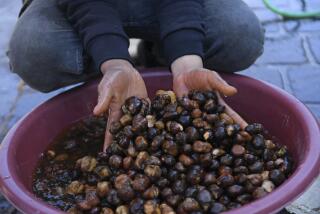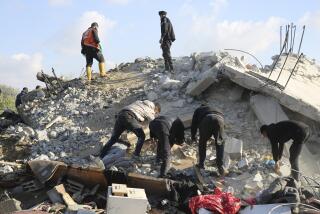Militants strike in France, Tunisia and Kuwait, killing as many as 60
Armed militants struck within hours of each other on three continents Friday, wielding bombs, firearms and a gruesome display of a decapitated head in a demonstration of the growing global reach of Islamist violence.
The militant group Islamic State claimed responsibility for the suicide bombing of a Shiite mosque in Kuwait and an attack on a seaside resort in Tunisia, and it may have at least inspired an attack on a gas factory in France. The extremist organization, now controlling large parts of Iraq and Syria, has sought to expand its influence well beyond the Middle East.
As many as 60 people were killed in the attacks, more than half of them by a gunman who went on a rampage outside a hotel popular with foreign holidaymakers on the sunny Tunisian coast. Up to two dozen people died in the bombing of the mosque, and one man was beheaded in France. The violence marred the holy month of Ramadan, which began last week.
An Islamic State leader this week had called on acolytes to use Ramadan, traditionally a time of spiritual reflection and acts of kindness, as an opportunity instead to bring “calamity for the infidels.”
“Be keen to conquer in this holy month and to become exposed to martyrdom,” Abu Mohammad Adnani, a spokesman for the Sunni militant group, said in an audio message released Tuesday. He urged followers to mount attacks in Libya, Syria and Iraq against Westerners, Shiite Muslims and any Sunni Muslims who opposed Islamic State.
He also warned President Obama of retaliation for the air raids that U.S. forces have helped carry out against the militants.
The nearly half-hour audio message was a fresh example of Islamic State’s sophistication in disseminating its extreme worldview through online and social media, tools that allow the group to project its gospel of violence far outside the territory it rules with an iron fist.
Islamic State “has definitely proved itself a lot more capable than major groups in the past at spreading that propaganda, whether it be blogging, the Internet,” said Alan Fraser, a Middle East expert at the London-based risk consultancy AKE. “And part of the brutality of Islamic State’s activities in Iraq and Syria [is] designed to get that kind of media attention.
“That’s one of its tactics. It’s very hard to combat.”
Savagery akin to that seen in the group’s slickly, and sickly, produced videos of mass executions and beheadings was evident in the attacks Friday, which struck places of work, worship and relaxation in Europe, Asia and Africa, respectively.
The severed head of a previously killed man was hung from a fence near the U.S.-owned gas factory in southeastern France that attackers tried to blow up by ramming a car into the plant about 9:30 a.m. Friday. Flags with Arabic inscriptions lay close by, French media reported.
French President Francois Hollande said a message had been written on the decapitated body. He added that there was no doubt it was a terrorist attack, and French anti-terrorism prosecutors have opened an investigation.
Two other people were injured in the explosion at the Air Products factory in the small town of Saint-Quentin-Fallavier, outside the city of Lyon, Hollande said.
A suspect was quickly arrested after the incident and, though prosecutors said he refused to talk, was identified as 35-year-old delivery truck driver Yassin Sahli, who was known to workers at the plant. Interior Minister Bernard Cazeneuve said that French intelligence services had designated Sahli in 2006 as a potential extremist but stopped monitoring him two years later for undisclosed reasons.
Before being detained for questioning, a woman who said she was Sahli’s wife told Europe 1 radio that she had been married to her husband for a decade and that they and their three children were “normal Muslims” who led “a normal family life.”
“I don’t know what’s going on. It’s not possible,” she said in an increasingly distraught voice, describing her husband as “very, very calm.”
French media reported that the beheaded man was Sahli’s employer, the boss of a local transport company.
The gruesome violence in France came less than six months after the Jan. 7 rampage in Paris at the headquarters of Charlie Hebdo, the satirical magazine targeted because of its cartoons of the prophet Muhammad, and a Jewish supermarket. Twenty people were killed, including the three attackers.
France has been on alert for further attacks. In April, an Algerian national linked by authorities to Al Qaeda and Islamic State was arrested on suspicion of plotting a gun attack on churches in Paris.
Security was stepped up at other sites in the region where Friday’s assault occurred, for fear that the incident might either serve as a prelude to a larger attack elsewhere or inspiration for copycats.
In Tunisia, a gunman disguised as a bather killed at least 37 people with a Kalashnikov rifle that he hid under a beach umbrella and used to strafe the pool and shore area of a hotel in Sousse, a popular vacation spot about 90 miles south of the capital, Tunis.
Terrified swimmers dashed out of the surf to find cover. Sunbathers were shot dead in their lounge chairs on the private beach fronting the Hotel Riu Imperial Marhaba.
Many of the dead were European travelers, according to Tunisian officials. Britain confirmed that at least five British nationals were killed.
Vacationer Steve Johnson told the BBC that he and others barricaded themselves in the hotel spa to wait until they were told it was safe to come out.
“We heard what we thought was fireworks,” he said. “Then people were screaming and starting to run in all directions.”
An official from the Tunisian Interior Ministry told Tunisian radio that the gunman was killed by security forces. The official identified the attacker as a student from the city of Kairouan, 35 miles inland from Sousse.
It was the second major strike in three months on the crucial tourist industry in the North African nation, which had been one of the few bright spots to emerge from the Arab Spring uprisings that tried to bring more democracy to the region. In March, attackers shot dead 21 visitors, most of them European cruise passengers, at the Bardo National Museum in Tunis.
------------
FOR THE RECORD
5:10 p.m.: A previous version of this post said most of the Bardo National Museum victims were Egyptian cruise passengers. They were European passengers.
------------
Militants declaring allegiance to Islamic State claimed responsibility for that assault.
Friday’s rampage was praised on a forum associated with Islamic State. A Tunisian calling himself Abou Anas said gleefully on Twitter: “Didn’t we tell you that this is a month of conquests, a hard blow to tourism.”
He characterized the dead as “apostate crusaders” and added: “Hahahaha.”
In the only one of Friday’s three attacks that Islamic State said it directly instigated, a suicide bomber blew himself up inside a Shiite Muslim mosque in Kuwait. The Persian Gulf nation has witnessed a recent rise in sectarian tensions between Sunni and Shiite Muslims.
Video footage showed dazed, white-clad worshipers milling about in the smoke from the blast, which killed up to two dozen people.
Despite the close timing of the three attacks in France, Tunisia and Kuwait, a Pentagon spokesman said it was “too soon to tell” whether they were “coordinated centrally or coincidental.”
“We continue to look into it,” U.S. Army Col. Steve Warren said. “We’re collecting intelligence as rapidly as possible.”
He noted that other militant groups in the Middle East have recently begun “re-branding” themselves as part of Islamic State to “gain access to additional resources, additional recruiting and things of that nature.”
Such groups have found Islamic State’s military and public-relations coups inspiring. Islamic State fighters sought to add to those gains Friday by continuing a vicious attack on the Kurdish-majority town of Kobani in Syria, wantonly killing at least 142 civilians, sources said.
The organization has increasingly tried to supplement its battlefield successes by encouraging terrorist attacks by “lone wolves” in far-flung locales.
“Islamic State, since it was formed, has taken a different approach than Al Qaeda certainly did … focusing a lot more on the conflict within the boundaries of Iraq and Syria rather than carrying out attacks abroad. That’s changed over the last six months, certainly with statements about striking beyond those boundaries,” said Fraser of AKE.
Rogue attacks on “soft” targets such as those hit Friday are tough to prevent, he said.
“It’s very hard to keep tabs on everyone and also to gather the amount of evidence required to justify continuous monitoring with limited resources,” said Fraser.
After the three attacks, messages of solidarity and condolence poured in from around the world to the affected countries.
U.S. State Department spokesman John Kirby was among those condemning the attacks.
“We will continue to work with all of our allies and partners to address the shared threat of terrorism and violent extremism and to degrade and destroy the ability of these terrorist groups to carry out their callous attacks on innocent people,” he said in a statement.
British Prime Minister David Cameron said: “The people who do these things, they sometimes claim they do it in the name of Islam. They don’t. Islam is a religion of peace. They do it in the name of a twisted and perverted ideology that we have to confront with everything that we have.”
Chu reported from London and King from Cairo. Special correspondents Christina Boyle in London, Kim Willsher in Saint-Quentin-Fallavier, France, Nabih Bulos in Amman, Jordan, Amro Hassan in Berlin and Times staff writer W. J. Hennigan in Washington contributed to this report.
More to Read
Start your day right
Sign up for Essential California for news, features and recommendations from the L.A. Times and beyond in your inbox six days a week.
You may occasionally receive promotional content from the Los Angeles Times.






